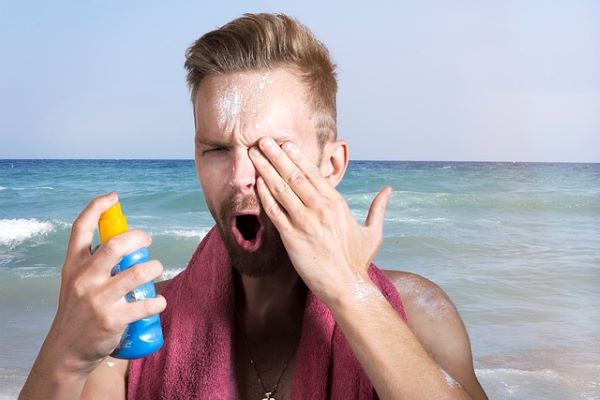When we think of Wearing Sunscreen, summer beaches and blazing sunshine often come to mind. But let’s flip the script—what if I told you wearing sunscreen is just as essential during winter? Yes, even when it’s cloudy, chilly, or snowing outside. For 30 days, Sun Protection, commit to wearing sunscreen daily, and you might be surprised at the benefits you’ll notice. Let’s dive into why sun protection matters all year round.
Also, read: Try a 30-Day Lip Care Routine to Avoid Winter Chapping
Winter Sun Isn’t Harmless- Sun Protection
You might wonder, “Do I need sunscreen when it’s cold?” It’s a fair question—after all, the sun feels less intense in winter. But here’s the thing:
- UV Rays Don’t Take a Break: Ultraviolet (UV) rays, particularly UVA, penetrate clouds and windows, reaching your skin even on gloomy days.
- Snow Reflects UV Rays: According to research published in Photodermatology, Photoimmunology & Photomedicine, snow reflects up to 80% of UV radiation, doubling your exposure.
- Cumulative Damage: The damage from UV rays builds up over time, contributing to wrinkles, dark spots, and even skin cancer. (Source)
So yes, sunscreen in winter is non-negotiable if you want to protect your skin from aging and health risks.
What Happens When You Wear Sunscreen for 30 Days?
Here’s a sneak peek into what consistent sunscreen use can do for your skin over a month:
- Reduced Redness and Sensitivity
Winter weather combined with UV exposure can leave your skin red and irritated. Sunscreen creates a barrier, calming your skin. - Brighter, Even-Toned Skin
Sunscreen helps prevent hyperpigmentation caused by UV rays, leaving you with a more even complexion. - Fewer Fine Lines and Wrinkles
Daily use of sunscreen slows down photoaging—those fine lines and wrinkles caused by sun damage. - Healthier Skin Overall
By blocking UV rays, sunscreen gives your skin a chance to repair itself, reducing long-term damage. (Source)
How to Pick the Right Sunscreen
Choosing a sunscreen can feel overwhelming with all the options out there. But don’t worry—I’ve got your back. Look for:
- Broad-Spectrum Protection: This means it shields you from both UVA (aging rays) and UVB (burning rays).
- SPF 30 or Higher: SPF 30 blocks about 97% of UVB rays, which is plenty for daily use.
- Hydrating Formulas: In winter, opt for sunscreen with added moisturizers like hyaluronic acid or ceramides to combat dryness.
- Non-Greasy Options: If you’re worried about breakouts, go for a non-comedogenic sunscreen. (Source)
Week-by-Week Experience
Week 1: Getting Into the Habit
At first, remembering to apply sunscreen every day might feel like a chore. But trust me, once you integrate it into your morning routine—right after moisturizing—it becomes second nature.
Tip: Keep your sunscreen by the sink or in your bag as a visual reminder.
Week 2: Subtle Changes Appear
By now, you might notice your skin feels softer and less reactive to the cold. That’s because sunscreen prevents your skin from losing moisture due to UV exposure.
Pro Tip: Don’t forget your lips and hands! Use a lip balm with SPF and reapply sunscreen to your hands after washing them.
Week 3: Compliments Roll In
You might not realize it, but others will start noticing a healthy glow. Sunscreen prevents dullness, leaving your skin looking more vibrant.
Week 4: Long-Term Benefits Kick In
By the end of 30 days, you’ll likely see fewer dry patches and a more even skin tone. And the best part? You’ve reduced your risk of cumulative sun damage.
The Science of Sunscreen
Wearing sunscreen daily isn’t just a beauty hack—it’s backed by solid research. A study published in The Annals of Internal Medicine showed that people who used sunscreen daily had 24% less skin aging compared to those who didn’t.
Additionally, the Skin Cancer Foundation states that regular sunscreen use reduces your risk of melanoma (a deadly skin cancer) by 50%. (Source)
Addressing Common Sunscreen Myths
1. Sunscreen isn’t necessary indoors.
Think again! UVA rays penetrate windows, so sunscreen is essential if you’re near a window.
2. Darker skin tones don’t need sunscreen.
While melanin provides some protection, it’s not enough to block all UV damage. Sunscreen benefits everyone.
3. Sunscreen causes breakouts.
Not if you choose the right formula. Look for non-comedogenic products that won’t clog your pores.
FAQs About Wearing Sunscreen
1. Can I skip sunscreen on cloudy days?
Nope. Up to 80% of UV rays can pass through clouds, so sunscreen is a must even when it’s overcast.
2. How often should I reapply sunscreen?
Ideally, every two hours if you’re outdoors. If you’re indoors, once in the morning is sufficient.
3. What about makeup with SPF?
Makeup with SPF is a nice bonus, but it’s not enough. Use a separate sunscreen underneath.
4. Do I need sunscreen with SPF 50 or higher?
For daily use, SPF 30 is enough. SPF 50 offers slightly more protection but isn’t dramatically better.
5. Is sunscreen safe for sensitive skin?
Look for mineral sunscreens with zinc oxide or titanium dioxide—they’re gentle and effective.
Final Thoughts
So, what’s the verdict? Wearing sunscreen daily, even in winter, might just be the best skin care decision you’ll ever make. It protects your skin from premature aging, reduces your risk of skin cancer, and keeps your complexion smooth and hydrated.
Give it a try for 30 days and see how your skin transforms. And hey, if you slip up once or twice, don’t stress—consistency over time matters. Let’s make winter sun protection a habit worth keeping!





